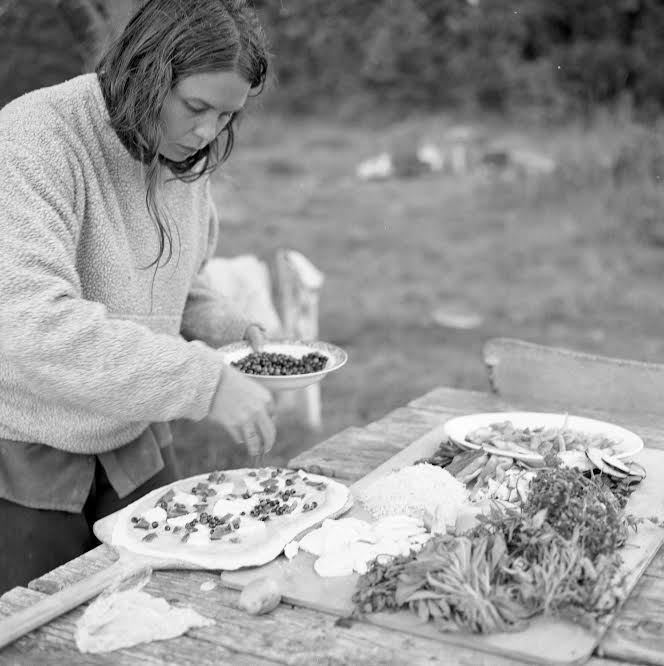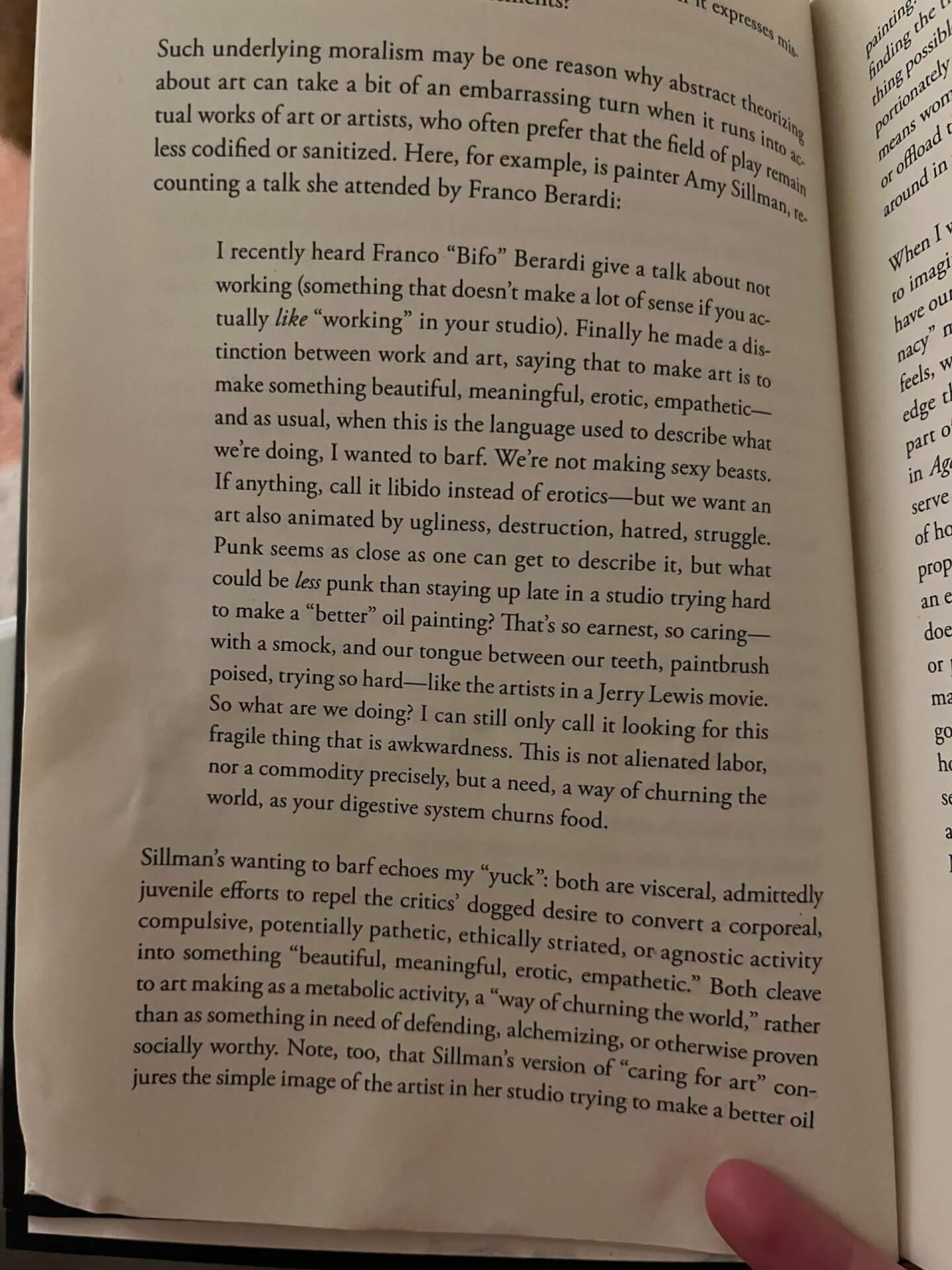
Coco Gagnet ’18 preparing a gorgeous pizza on Community Day Fall 2021
An interview with Coco Gagnet ‘18, Community Manager, by Matt Walker ’04.
MW: “Please state your name, the year you graduated from Antioch, and where you’re from.”
CG: “My name is Coco Gagnet and I graduated in 2018. I’m from Dayton, Ohio.”
MW: “Current job title?”
CG: “I’m the Community Manager.”
MW: “Thank you… for posterity… you never know…?”
CG: “Yeah. I know. It’s important. And I consent to being interviewed.”
MW: “Oh, that’s great.”
CG: “Best practice.”
MW: “I love consent. All right. I was looking at the interview from when you started as the Community Manager and there was a quote that I thought was super applicable in this situation. You said:
“I think about the philosophy of Dr. King and the Beloved Community. The utopian vision grounded in agape, a coming together that values radical hospitality, love, justice, and all life sharing in the abundance of Earth. Ultimately, I think of community as the word we use to describe being together, or more closely figuring out how to be together. That kind of community practice I’m interested in is necessarily utopian, a process full of hope and risk and resilience, all in the service of taking care of one another and Earth.”
“Wow! Does any of that still ring true or would you care to comment on that?”
CG: “Yeah, I think it still rings true. I was reading something recently in a book called “On Freedom” by Maggie Nelson. And there was an interview, I forget who the painter was, but he was giving a lecture and saying something about, ultimately the role of the artist is to make something beautiful. And then there was another painter who responded and was like, “That makes me want to barf!” That’s the TLDR (too long; didn’t read) of the conversation. But I don’t know. I think that even though I hold Beauty, capital B, as a fundamental value and aspiration in terms of how I build relationships and how I build community.”

“On Freedom” by Maggie Nelson
“There’s also something in that, that maybe negates or doesn’t capture the messiness of just figuring it out. And maybe sometimes we don’t actually know what we’re doing or what we’re striving for. And it’s more so that we’re just trying to exercise or synthesize some impulse that is a little unknowable.”
“And so, yeah, I think that I still believe everything that I said, and I’m in agreement, but feel like it’s been just complicated by some of the complexity of lived experience and how not beautiful it is sometimes.”
MW: “Interesting.”
CG: “Yeah.”
MW: “Community and Beauty. Ugliness. Is Ugliness the opposite of Beauty?”
CG: “Yeah, I don’t know, maybe it’s ugliness. Or unruliness. Or undefinability or something. I don’t know.”
MW: “Oh, okay. Undefinability within communities is what I’m hearing? Maybe you still agree with that but now your views are more tempered by this experience? And there is kind of a flip side to this being together thing?”
CG: “I don’t even think it’s a flip side. I think it’s just a complication.”
MW: “Wow. Okay.”
CG: “Yeah.”
MW: “I have to think about that one for a while.”
CG: “Yeah, me too. It’s just what came up. So…”
MW: “You mentioned the other day that you had been thinking a lot about intuition. Any remarks on intuition?”
CG: “Yeah, I think this also connects to what I was saying about learning about grounded presence. But I think people will often express confusion between what’s my intuition talking and what’s my anxiety or paranoia or non intuition, whatever. And, I think part of it is that intuition doesn’t talk at all. If you notice yourself doing any narrativizing, any storytelling, then it’s not intuition. Intuition is just the felt information of any moment. I think a lot of the strength of interpersonal work and relational work is being able to literally feel the room at any given moment, without ascribing the narrative dynamics to it, or the talk. It’s just about sensing what’s there and then not applying reasoning or a rationale or an agenda to it. I mean, my therapist said something really brilliant the other day, she doesn’t say anything that often, but we were talking about the difference between intuition and then towards confirmation bias or towards just confirming the thing that you want or desire or whatever. And the truth is desire has it’s own fucking agenda and you have to just call it for what it is. I guess that’s all I have to say about that.”
MW: “What are some lessons or takeaways from your time as Community Manager?”
CG: “I don’t feel like any one person could or should capture the spirit of a place or hold it up on their own. And how I felt like some of the ethos or the trajectory that I wanted to carry into playing the role of Community Manager is that I didn’t want to build anything to last. I just wanted to build something to fall apart eventually. And so I’ve always tried to, I guess, carry that conviction into my work, because of a larger sense of dissolve or things continuing to change, and I think that institutions and institutional conversations around what we’re building together just often assume longevity as a measure of success. And it’s not the case. The reality is we’re just trying a whole bunch of different things in a really dysfunctional fucked up matrix and reality.”
“So I think I’m leaving with that lesson feeling affirmed. But it’s in the tension of getting caught up in institutional momentum around what we’re trying to create or what we’re trying to do and long term programs or initiatives that sustain that work. And so now I’m being re-confronted with the lesson of having to detach from the outcome or the longevity or how long something will persist and that being indicative of any sense of value or success.”
“I also think that, I don’t know how to summarize this into a lesson, but I’ve really learned the importance of grounded presence as an expression of integrity. Being in my role, or being in this role, means that I hold a lot of different conflicting opinions at once. I’m constantly being confronted or internalizing other people’s perspectives about either the College, or a group at the College, or another person. And sometimes I have interpersonal relationships with people who are directly in conflict. And I’ve just really learned how to not give a lot of weight to what anybody thinks while also holding everyone’s experiences and perspectives with the utmost sincerity.”
“I think the last thing I would say is that I’ve just really had to let go of a lot of perfectionism and anxiety about doing the right thing or saying the right thing. And a lot of the time I haven’t had a mentor or anyone to offer me much guidance in this role or how it should be utilized. And so, I’ve kind of just had to try a bunch of shit out and not get too caught up in what people’s reactions are going to be.”
“Something that I come back to a lot is that I feel like if you have conversations with any given community member about what are the problems at the College, one piece of it is that consistency or commitment might be named, or might have been named historically, about how there’s a certain level of energy and then we don’t follow through or carry out the action, the constant revolving door of either staff or students cycling out on Co-Op or whatever makes it difficult to follow through. But then the other piece is any given issue or dynamic has, for the most part, seemingly been a problem for many years, and often prior to the closure too. And so, I think that there is a real desire and hope that we’re going to arrive and figure out some kind of mastery.”
“But I don’t think that it’ll ever really happen and I’ve repeated this in a couple of different spaces. But my friend, Greta, who graduated a year ahead of me, she said something that really impacted me once that, I think, was specifically in response to people saying we’re all talk and no action. But we just have to accept that we’re going to have the same conversations over and over again, and that it’s necessary to have the same conversations over and over again, and it’s not as much a circle as it is a spiral. I don’t know where this thought initiated, but it’s just given me a lot more patience for the process. Because, ultimately, in some ways, I’m not that invested in the institution itself. It’s the larger symbolism or vision. I think that’s what a lot of people feel connected to.”
